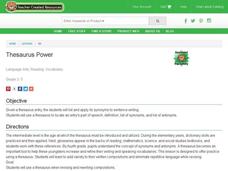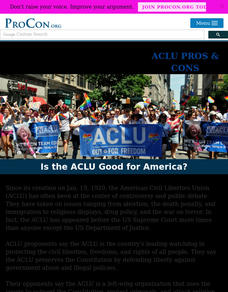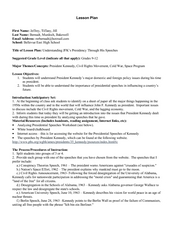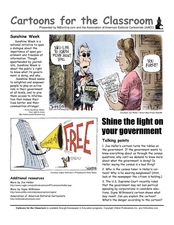Curated OER
Taking to the Airwaves
Young scholars consider the purpose of talk radio and examine its importance in the new democratic Iraq. They enact mock talk shows based on current events and reflect on the value of free speech and the role audience members play in...
Administrative Office of the US Courts
Hazelwood v. Kuhlmeier
Freedom of speech is not always free. Scholars investigate how the First Amendment provides for the right to express opinions. Through the court case Hazelwood v. Kuhlmeier, they analyze free speech using primary documents—and hopefully...
Curated OER
Thesaurus Power
Give your class the advantage of Thesaurus Power! They will use a thesaurus to understand word meanings and relationships. They focus on how a thesaurus functions and how it gives the entry word, definition, synonyms, antonyms, and part...
Carolina K-12
Minnesota v. White: Exploring a Judicial Candidate’s First Amendment Rights
After watching a documentary on the Supreme Court case Republican Party of Minnesota v. White, class members research how the First Amendment and free speech issues influence judicial elections and then conduct a mock judicial election.
Curated OER
ACLU
Is the American Civil Liberties Union (ACLU) good for America? The informative website is a one-stop shop for ACLU debate resources. Scholars read about the topics surrounding the issue, including free speech, national security, and...
Curated OER
Does Free Speech Exist in School?
Students examine their own First Amendment rights as students. They read and discuss a news article, discuss the Supreme Court case Frederick v. Morse, take an online quiz and conduct Internet research, and create a brochure outlining...
Curated OER
Understanding JFK's Presidency through his Speeches
Students reflect and discuss the major events that happened in the United States in the 1950's and 1960's. In this U.S. History lesson, students read and analyze the famous speeches during this time frame, then complete a worksheet that...
K12 Reader
Churchill's Speech: We Shall Fight on the Beaches
Winston Churchill speech delivered to the House of Commons on June 4, 1940, is the focus of a comprehension exercise that asks readers to explain how the repetition in the speech supports the main purpose of Churchill's address.
K12 Reader
What's the Purpose? FDR's Pearl Harbor Speech
FDR's December 7, 1941 address to the nation is the focus of a reading comprehension exercise that asks middle schoolers to read an excerpt from the Pearl Harbor speech and determine the president's purpose.
Curated OER
Analyzing Atmosphere: Macbeth Murder Scene and Dagger Speech
Shakespeare's Macbeth (Act II, Scenes I and II) lacks explicit details of the murder of King Duncan, yet the author creates an atmosphere that allows us to visualize the event. Readers interpret the "Dagger Speech" by writing stage...
Curated OER
Conservation: Matching
Matching the vocabulary terms with the correct definition can be a fun way to build a content specific vocabulary. The class matches the words in the right column to the definitions in the left. Words are labeled by parts of speech.
Curated OER
Parts Of Speech
In this language arts worksheet, 5th graders match the part of speech with a word and the answers are found by clicking the button at the bottom of the page.
Curated OER
Create a Parts of Speech Newspaper
In this parts of speech worksheet, students write articles and include pictures about parts of speech to make a newspaper. Students write 8 articles about parts of speech and include examples.
Curated OER
Persuasive Speech Preparation Worksheet
In this persuasive speech preparation instructional activity, students evaluate their speech for topic, purpose, audience, method, and support, as well as introduction and conclusion.
Curated OER
The Civil War: A Nation Divided
Discuss the differences between the North and the South and how those differences led to the Civil War. Middle schoolers examine and analyze a famous speech or writing by President Lincoln in order to better understand the speaker's...
State Bar of Texas
Texas v. Johnson
If you saw a person burning an American flag, how would you feel? Scholars analyze the concept of freedom of expression and speech with the Supreme Court case Texas v. Johnson. A short video clip creates open discussion in pairs on the...
K12 Reader
Color the Christmas Adjectives
'Tis the season to be joyful, merry, beautiful, and red! Test young learners' knowledge of parts of speech with a festive coloring worksheet. As they identify which words are nouns and which words are adjectives, they color each part of...
K12 Reader
Prepositional Phrases II
Hidden within these sentences are prepositions; think your students can find them? After first reading a brief explanation of this part of speech, young grammarians are asked to examine eight sentences, underlining the prepositional...
K12 Reader
Change the Predicate Adjectives
Review parts of speech and revise writing for clarity with one instructional activity! Elementary grammarians change ten predicate adjectives to attributive adjectives, combining two choppy sentences into one smooth thought.
College Board
2015 AP® English Language and Composition Free-Response Questions
Many schools have honor codes, but scholars do not always choose to follow them. As part of a series of free-response questions from the AP® English Language and Composition Exam, learners discuss the benefits or disadvantages of honor...
Curated OER
Cartoons for the Classroom: Shine the Light on Your Government
What don't we know about our government? Explore the concept of transparency and freedom of information throught this analysis handout, in which scholars examine 2 political cartoons. Background information provides context, explaining...
College Board
2014 AP® English Language and Composition Free-Response Questions
For some students, college may not be worth the cost. Free-response questions from the 2014 AP® English Language and Composition exam cover a variety of topics, including the value of a college education. Writers review six sources to...
College Board
2002 AP® English Language and Composition Free-Response Questions
It is not what you say but how you say it. Scholars use an essay prompt from the 2002 AP® English Language and Composition Free-Response Questions to analyze how an author uses language to describe her past. They also support or argue a...
College Board
2000 AP® English Language and Composition Free-Response Questions
No one is perfect. George Orwell argues imperfection is preferred over sainthood. Scholars write essays describing how he expresses his argument in writing. Writers also respond to Eudora Welty's recollection of life experiences with...
Other popular searches
- Free Speech First Amendment
- Free Speech and Music
- Limits on Free Speech
- Free Speech Limits
- Free Speech Movement
- Wartime Free Speech
- Free Speech in Hollywood
- Free Speech Worksheets
- Berlely Free Speech Movement
- Berkley Free Speech Movement
- Free Speech +First Amendment
- Free Impromptu Speech Topics

























